If you’re weighing whether to go to college or spend those four years gaining work experience instead, you’re probably weighing “education vs experience.” What you need to know is that it’s not quite that simple.
Pitting these two concepts against each other creates a false dichotomy – as if these terms are mutually exclusive when really, they’re almost interchangeable.
There’s a quote that’s commonly attributed to Mark Twain that goes something like this: “I have never let my schooling interfere with my education.”
Whether Mark Twain is actually the origin or not, this quote speaks directly to the heart of the matter at hand: it’s a mistake to conflate “schooling” (formal education) and “education” (life experience). It’s time to put that idea to bed forever.
Your education isn’t limited to knowledge and skills acquired in formal learning environments.
Instead, it’s the sum of all your experiences and what you’ve learned from them. Think of your education and experience as a Venn Diagram: there is a LOT of overlap, and this overlap represents your actual knowledge and skills.
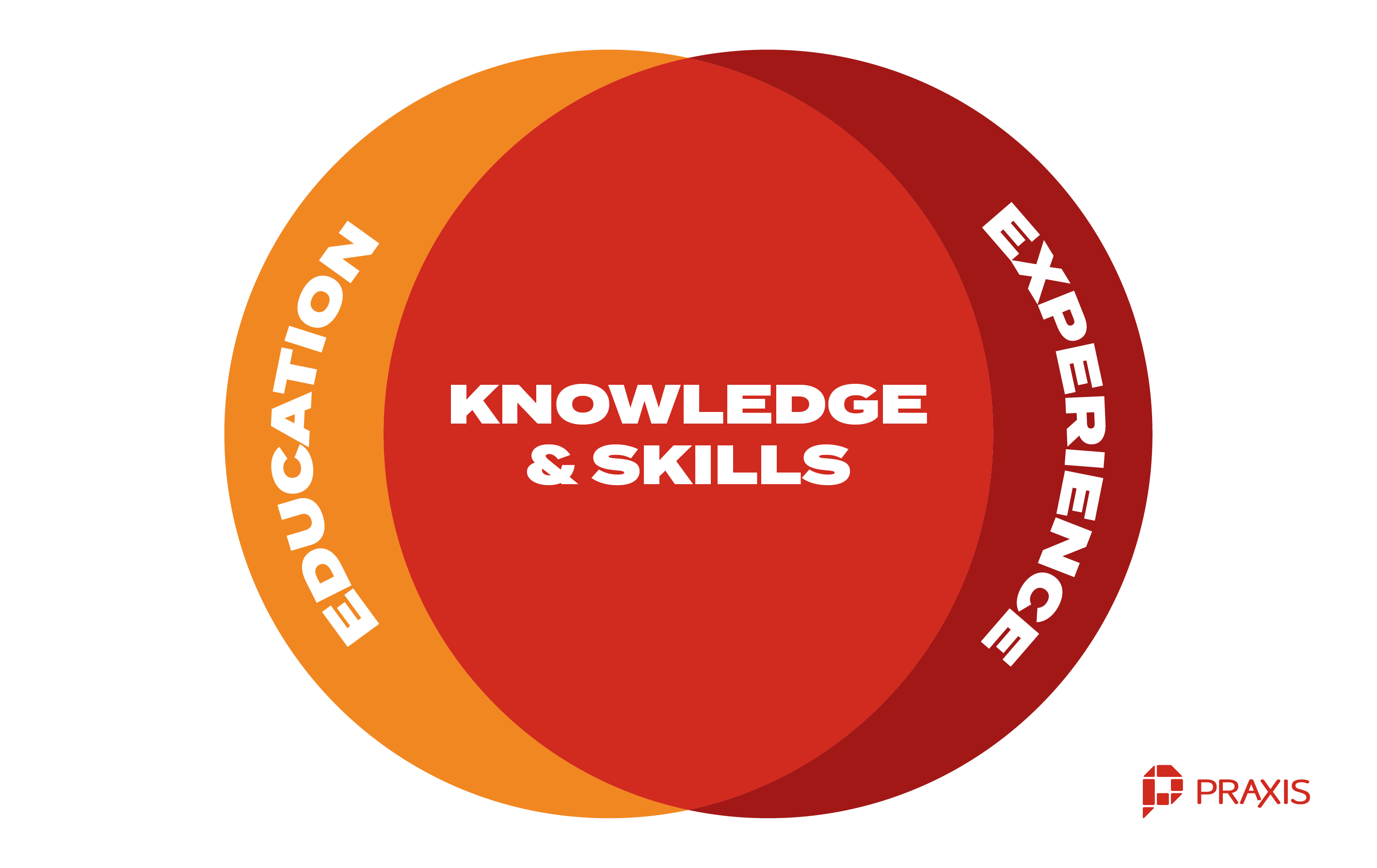
Education vs Experience: What Really Matters to Employers
At the end of the day, prospective employers (and clients) only care about whether you can provide the value they’re looking for. All they’re really asking themselves is whether bringing you onboard will help them to achieve their business goals.
This means two things matter when you’re applying for a job or pitching a client:
- Your ability to create value or results, and
- Your ability to convince them that you can create value/results for them.
Here’s the thing. They’re not going to simply take you at your word: they want proof. If you say you’re a highly-skilled marketer (insert whatever career path is relevant to you), they’re going to want some evidence of your capabilities, no matter how good of a salesperson you are.
In this context, “education” (used as synonymous with “schooling” in this case) and “experience” are proxies for proof. If a prospective employer or client looks at your resume and sees you have a degree in marketing from a prestigious school, they know you’re at least as knowledgeable on marketing as the average graduate of that school.
The same is true for “experience.” 3 years at company X and 2 years at company Y mean that two separate companies found it worthwhile to keep you on the payroll, which means you can’t be that bad at what you do.
Here’s what this looks like to employers:
Candidate A: “I got an A+ in my Digital Marketing class where we learned about running Facebook ad campaigns.”
Candidate B: “I was a core member of Ogilvy’s digital marketing team for 3 years.”
Here’s the good news: You don’t need to gain that experience at a company. And, more importantly, you can create actual proof, which means employers and clients don’t need to rely on proxies to gauge your ability to create value.
Consider what this looks like:
Candidate C: “I ran a paid Facebook ad campaign that doubled our sales and had a 400% ROI.” or “I increased organic traffic to this site by 300% in 3 months – here’s how I can do the same for you…”
Which candidate would you hire? I know I’d choose Candidate C, every time.
It All Comes Down to Proof and Storytelling
Once you get your foot in the door, a lot of successful interviewing and pitching comes down to how good you are at storytelling. The more information you give prospective employers about your experience, the more informed a decision they can make.
Here’s where that Venn diagram comes in handy:
The more closely you can tie together your experience (what you’ve done) and education (what you learned) when telling your story, the more appealing of a candidate you’ll be.
Concrete examples (proof) is how you transform the knowledge and skills you’ve gained – whether through education or experience – into value.
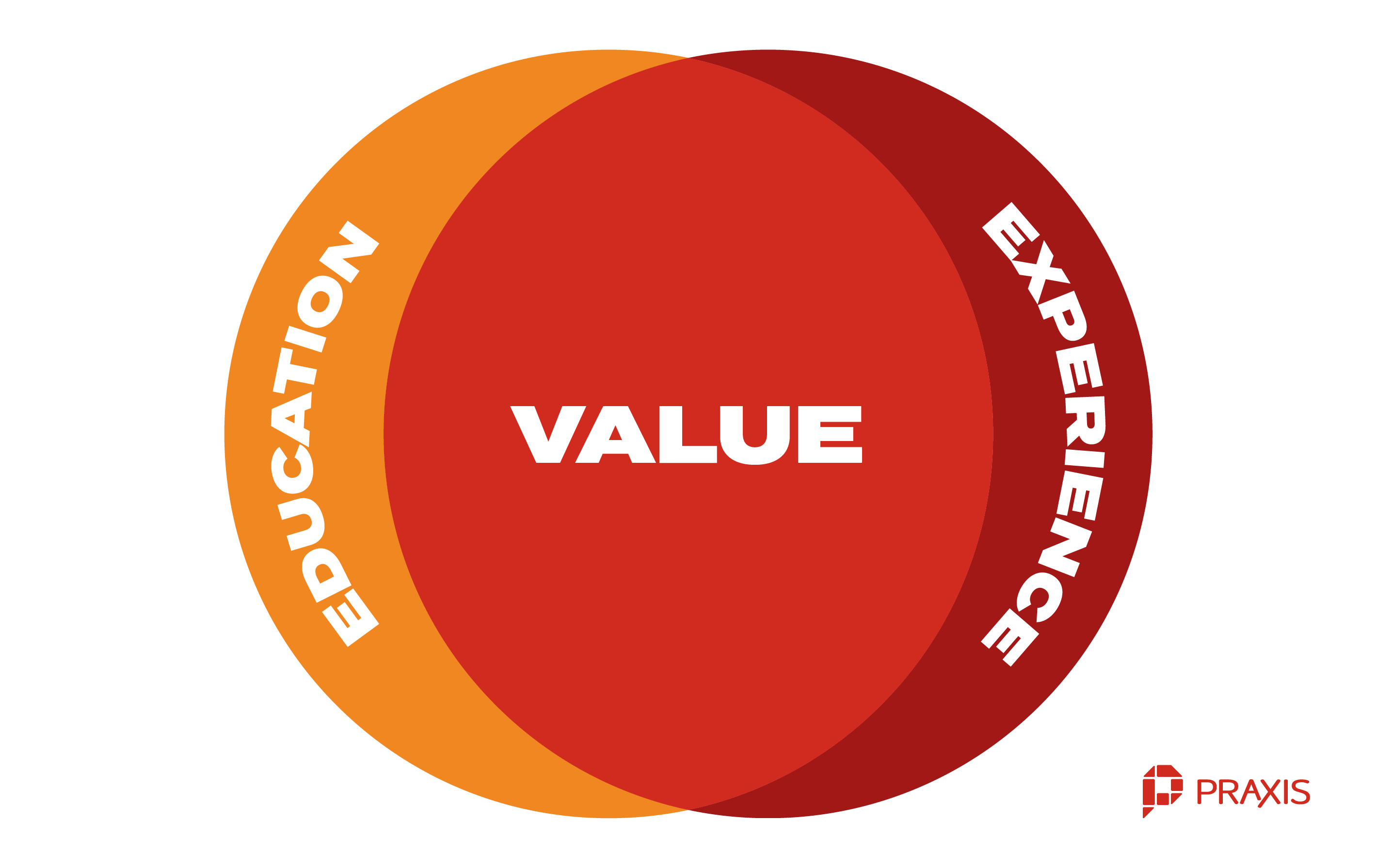
Here’s the kicker: this is true even if you’re describing past failures. If you can describe what you learned from your past mistakes (with the subtext that you won’t make them again), you’ll come across as more valuable than someone who hasn’t made any yet.
This is why almost every interview will include questions like “Tell us about a time you failed/made a mistake,” and “What is your biggest weakness?” and “Describe a situation in which you had to solve a problem and walk us through what you did.”
This is why experience matters. Mistakes can be expensive, so it makes sense that it’s in a company’s best interest if you’ve already made most of them on somebody else’s dime.
This is also why opting to start working straight out of school can pay off better than spending four years in college. You simply don’t get to make the kinds of mistakes that matter in college or those kinds of proof-driven experiences that employers are eager to hear about.
That said, keep in mind that how you tell a story is just as important as what you say. Talking about past failures is only a good idea if you can successfully spin it in your favor, so be sure to practice your storytelling skills so you can do your proof justice.
How to Up Your Experience & Education Stats Without More Schooling
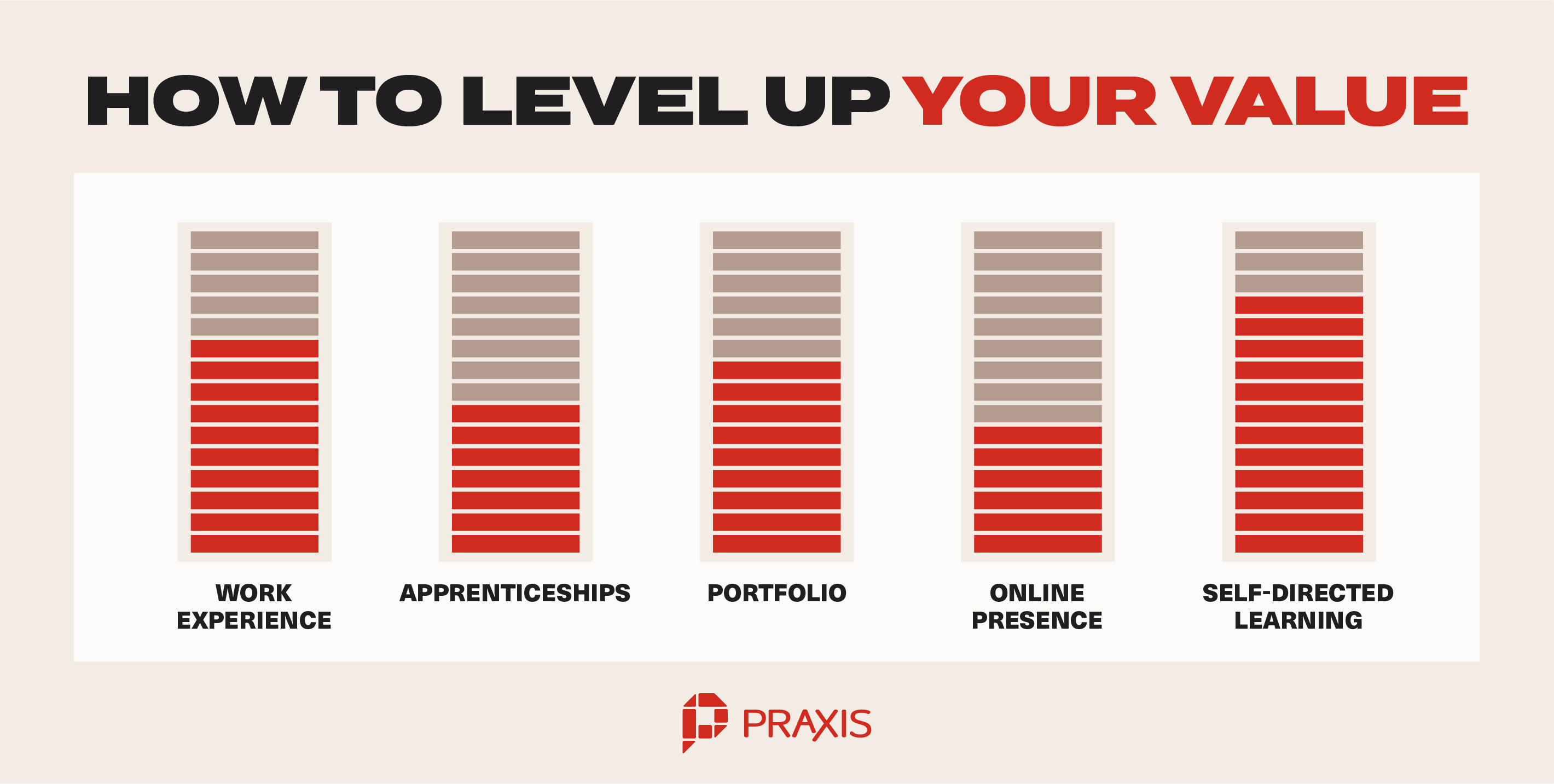
1. Get Work Experience
“The best way of learning about anything is by doing.” That quote comes from Richard Branson, a man who knows what he’s talking about. Branson is a high school dropout, founder of Virgin Group, and 12th on our list of 125 Successful People Who Didn’t Graduate College. According to Forbes, his net worth is over $4 billion.
Whether you know the path you want to follow or still are looking for a meaningful career, getting a job and stockpiling work experience is a great option. Most companies prefer to promote from within, and many offer access to both internal and external training to help advance your skills on the company’s dime.
2. Do an Apprenticeship
Apprenticeships are a great example of the symbiotic relationship between education and experience, combining on-the-job training with paid work in fields that require a skilled workforce. They’re most common in manufacturing, construction, and trade fields but can be found in all sorts of industries.
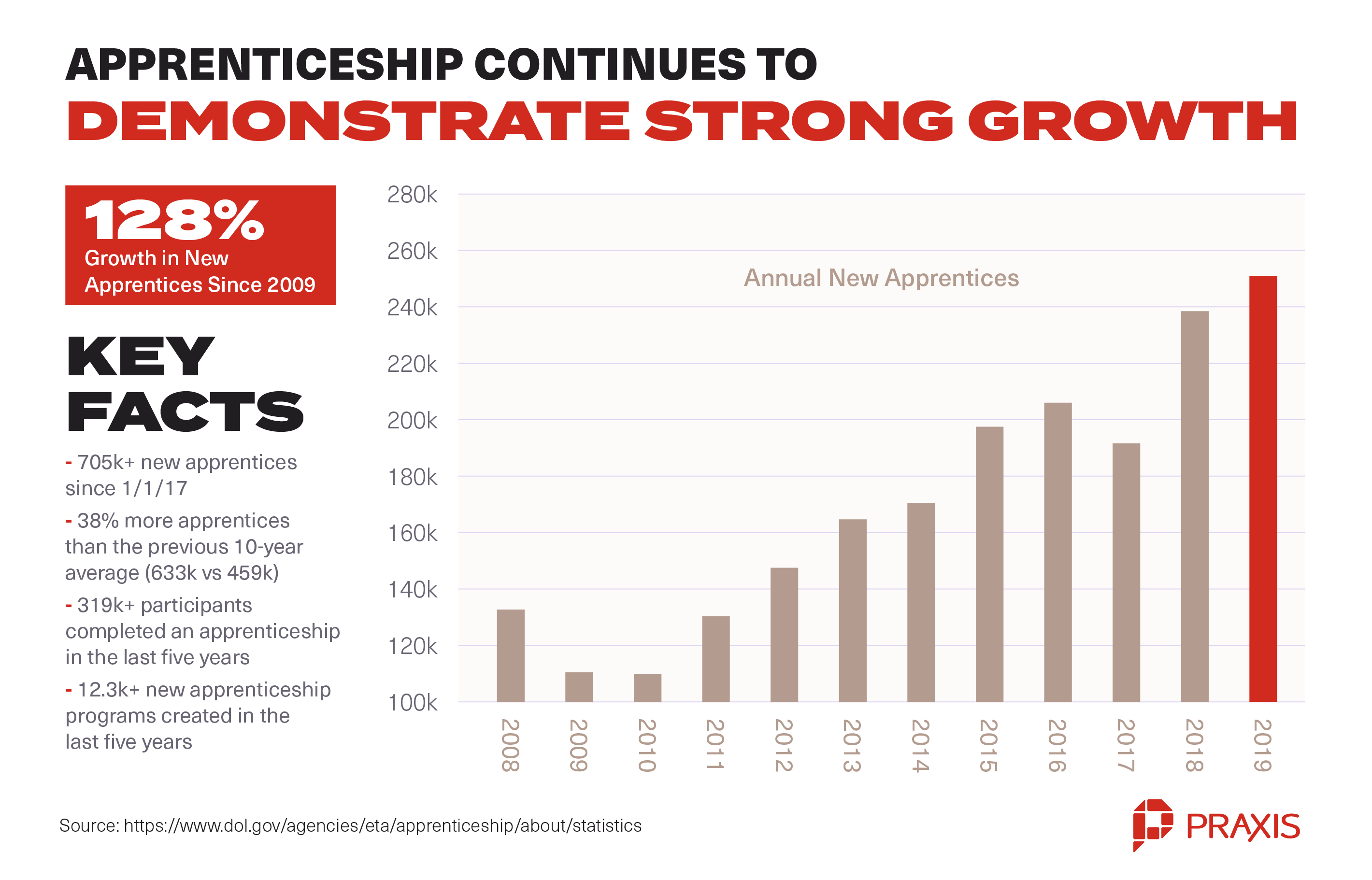
3. Build a Portfolio
We’re back at proof. Employers and customers alike want to see your past results. Building a portfolio of projects allows you to showcase your skills and effectiveness, which is crucial to convincing them of your ability to create value.
If you’re a marketer, being able to show that you’re familiar with the current best practices might be enough to land you a job, but having case studies that show your results in numbers will all but guarantee it.
4. Create a Digital Footprint
The reason schooling and work experience have traditionally been such important proxies for proof for employers is the access to better information. But these days, that’s not true anymore.
Applied for a job lately? You’d best believe they vetted your social media presence. While this may seem like an invasion of privacy, you can use this to your advantage by crafting a solid personal brand that shows prospective employers and clients exactly who you are and why they should hire you.
5. Explore Self-Directed Learning
Technological advancements have made information more accessible than ever, which has given rise to self-directed learning – the practice of taking charge of your own education by discovering what you need to learn, setting learning goals, choosing the strategies best suited to you, and evaluating your learning outcomes.
Self-directed learning gives motivated individuals the ability to gain education and experience simultaneously like never before.
Self-directed learning takes planning and dedication, and you have to make your self-directed journey a priority in order to succeed. It’s a lot like starting a business, except the service you provide is your own self-improvement.
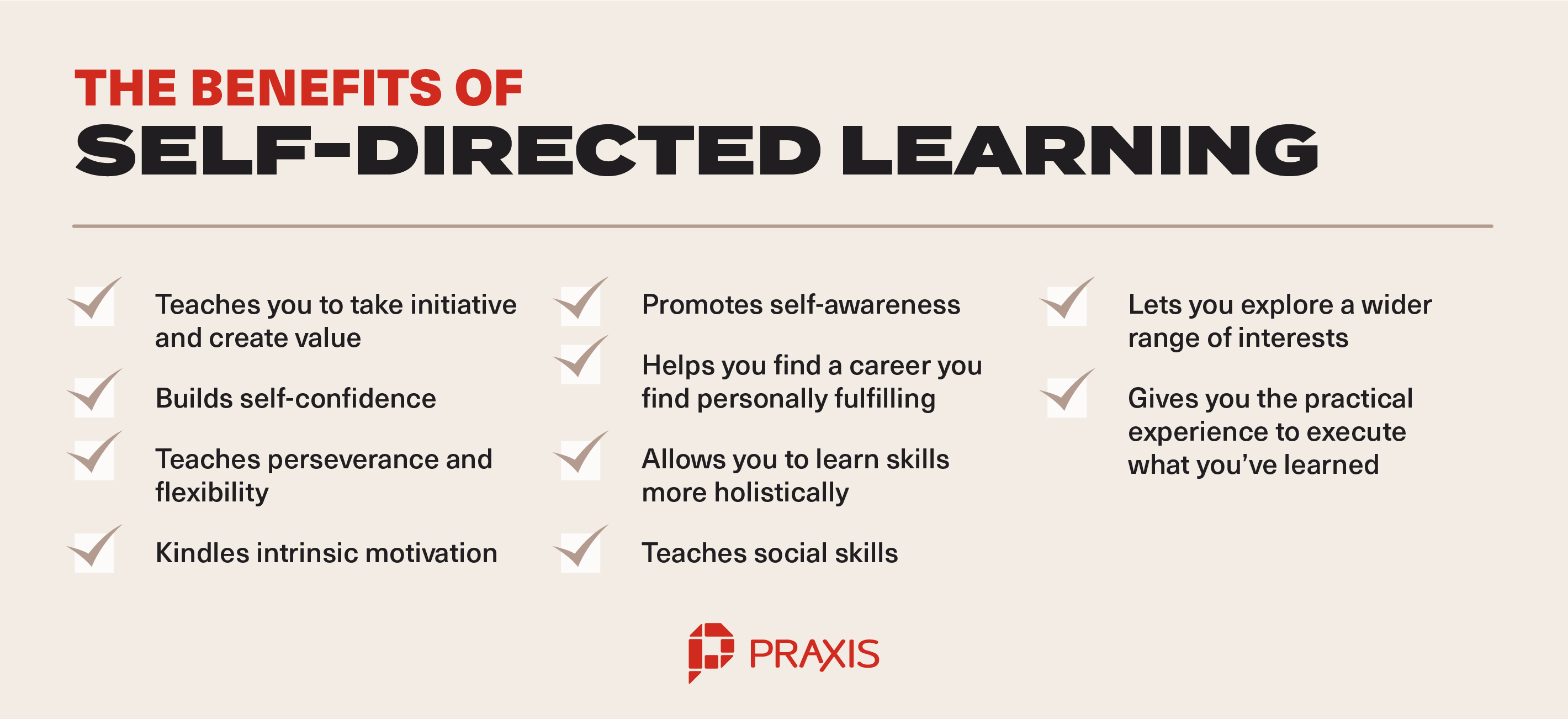
The biggest benefit of self-directed learning is that you’re in complete control of your education.
- You decide what you want to learn.
- You decide the best way to learn it.
- It’s easy and painless to change directions whenever you want.
That’s strikingly different from a typical college education. Sure, you can choose which school to attend and which subject to study, but the rest is mostly out of your control.
The control you have over your self-directed learning experience is what makes it one of the most effective ways to learn. Not only do you develop valuable skills in the subject areas you choose to study, but you also develop the most valuable skill of all – the ability to learn.
“Learning how to learn” may seem redundant, but it’s an important soft skill that’s vital to your long-term career success—just ask the
Institute for the Future, who said the following in a landmark 2017 report:
“The pace of change will be so rapid that people will learn ‘in the moment’ using new technologies such as augmented reality and virtual reality. The ability to gain new knowledge will be more valuable than the knowledge itself.”
Not only is self-directed learning a great way for today’s students to take control of their careers and tip the scales in their favor, but it’s about to become even more important.
Accelerate Your Self-Directed Learning
Are you ready to take charge of your career? Self-directed learning is just what you need. It’s the college alternative for the modern world and one of the best ways to develop and refine new skills while gaining the relevant work experience employers care about.
If you need a little guidance on your path of self-directed learning, Praxis can help. We’re the proven college alternative that’s helped hundreds of students embark upon their self-directed education journey – and land full-time jobs.
For more information about self-directed learning and how Praxis works, read Self-Directed Learning: A Primer for Ambitious Young Adults.
Tags:
Career DevelopmentFebruary 24, 2021
